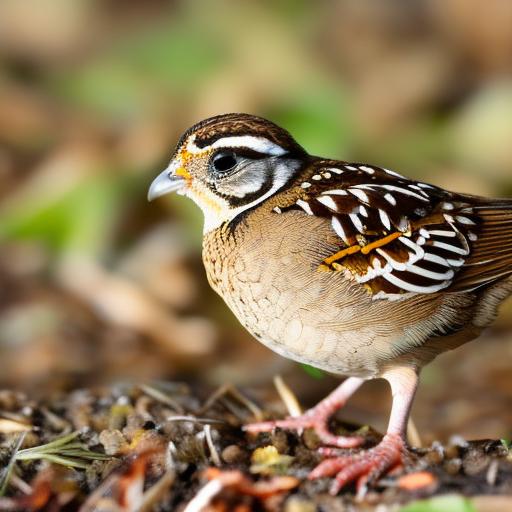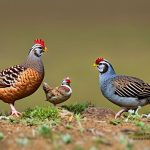Raising baby quail can be a rewarding and fulfilling experience, but it also comes with its own set of challenges. Many new quail owners may find themselves unprepared for the level of care and attention that these delicate creatures require. From creating a suitable environment to providing the right nutrition, there are many factors to consider when it comes to ensuring the health and well-being of baby quail. Additionally, identifying potential causes of death and seeking veterinary assistance when necessary are crucial aspects of raising baby quail. In this article, we will explore the various aspects of baby quail care, including understanding their needs, creating a suitable environment, providing proper nutrition, and seeking veterinary assistance when needed.
Key Takeaways
- Baby quail care requires attention to detail and specific environmental considerations
- Potential causes of death in baby quail include temperature fluctuations and improper nutrition
- Creating a suitable environment for baby quail involves providing proper bedding, heat sources, and space
- Nutrition and feeding considerations for baby quail include providing a balanced diet and access to clean water
- Seeking veterinary assistance is crucial if baby quail show signs of illness or distress
Understanding Baby Quail Care
When it comes to understanding baby quail care, it’s important to recognize that these tiny birds require specific conditions to thrive. Baby quail, also known as chicks, are delicate and vulnerable creatures that need a warm and safe environment to grow and develop. They are highly susceptible to stress, temperature fluctuations, and other environmental factors, so it’s crucial to provide them with the right conditions from the start. Additionally, baby quail have specific nutritional needs that must be met in order for them to grow into healthy adults. Understanding these needs and providing the appropriate care is essential for the well-being of the chicks.
In addition to their physical needs, it’s also important to consider the social aspect of baby quail care. These birds are social creatures that thrive in the company of their own kind. Providing them with appropriate socialization opportunities is crucial for their mental and emotional well-being. Understanding the social dynamics of baby quail and providing them with suitable companionship is an important aspect of their care. By understanding the specific needs of baby quail and providing them with the appropriate care and attention, you can ensure that they grow into healthy and happy adult birds.
Identifying Potential Causes of Death
Unfortunately, baby quail are susceptible to a number of potential causes of death, especially in their early days. It’s important for quail owners to be aware of these potential risks in order to take proactive measures to prevent them. Some common causes of death in baby quail include temperature fluctuations, stress, inadequate nutrition, and predation. Temperature fluctuations can be particularly dangerous for baby quail, as they are unable to regulate their body temperature effectively in the early days of life. Stress can also have a significant impact on the health of baby quail, leading to weakened immune systems and increased susceptibility to illness.
Inadequate nutrition is another common cause of death in baby quail. These birds have specific dietary requirements that must be met in order for them to grow and develop properly. Failing to provide the right nutrition can lead to stunted growth, weakened immune systems, and other health issues. Additionally, predation is a significant risk for baby quail, especially if they are kept outdoors. It’s important for quail owners to take proactive measures to protect their chicks from potential predators in order to ensure their safety and well-being. By being aware of these potential causes of death and taking proactive measures to prevent them, quail owners can help ensure the health and longevity of their chicks.
Creating a Suitable Environment for Baby Quail
Creating a suitable environment for baby quail is essential for their health and well-being. These delicate birds require a warm, safe, and stress-free environment in order to thrive. When setting up a brooder for baby quail, it’s important to provide them with a clean and dry space that is free from drafts and other environmental stressors. The brooder should be equipped with a heat source to maintain a consistent temperature, as well as bedding material to keep the chicks comfortable and secure.
In addition to providing a suitable brooder environment, it’s also important to consider the long-term housing needs of baby quail as they grow into adults. Outdoor enclosures should be secure and predator-proof, with plenty of space for the birds to move around and engage in natural behaviors. Providing suitable shelter, perches, and nesting areas is also important for the well-being of adult quail. By creating a suitable environment for baby quail from the start and considering their long-term housing needs, quail owners can help ensure that their birds have a safe and comfortable living space.
Nutrition and Feeding Considerations
Proper nutrition is crucial for the health and development of baby quail. These birds have specific dietary requirements that must be met in order for them to grow into healthy adults. When it comes to feeding baby quail, it’s important to provide them with a high-quality starter feed that is specifically formulated for game birds. This feed should contain the right balance of protein, vitamins, and minerals to support the growth and development of the chicks.
In addition to providing a suitable starter feed, it’s also important to ensure that baby quail have access to clean water at all times. Water is essential for hydration and digestion, so it’s crucial to provide the chicks with a constant supply of fresh water. Additionally, offering small amounts of finely ground grit can help support the chicks’ digestion by aiding in the breakdown of food in their gizzards.
As baby quail grow and develop, their nutritional needs will change. It’s important for quail owners to be aware of these changing needs and adjust their feeding practices accordingly. Providing a balanced diet that meets the specific nutritional requirements of growing quail is essential for their health and well-being.
Seeking Veterinary Assistance

In some cases, despite the best efforts of quail owners, baby quail may still experience health issues that require veterinary assistance. It’s important for quail owners to be aware of the signs of illness or distress in their birds so that they can seek veterinary assistance when necessary. Common signs of illness in baby quail include lethargy, loss of appetite, respiratory issues, diarrhea, or abnormal behavior.
When seeking veterinary assistance for baby quail, it’s important to find a veterinarian who has experience working with poultry or game birds. Not all veterinarians have experience with quail or other game birds, so it’s crucial to find a professional who is knowledgeable about their specific needs and health issues. A qualified veterinarian can provide a thorough examination of the chicks, diagnose any health issues, and recommend appropriate treatment options.
In addition to seeking veterinary assistance when necessary, it’s also important for quail owners to take proactive measures to prevent illness in their birds. This includes providing a clean and stress-free environment, meeting their nutritional needs, and taking steps to protect them from potential predators or other environmental stressors. By being proactive about their care and seeking veterinary assistance when needed, quail owners can help ensure the health and well-being of their birds.
Conclusion and Next Steps
Raising baby quail requires careful attention to their specific needs in order to ensure their health and well-being. From creating a suitable environment to providing proper nutrition and seeking veterinary assistance when necessary, there are many factors to consider when it comes to caring for these delicate birds. By understanding their needs and taking proactive measures to meet them, quail owners can help ensure that their birds grow into healthy and happy adults.
As you embark on your journey of raising baby quail, it’s important to continue learning about their specific needs and behaviors in order to provide them with the best possible care. Whether you are a new quail owner or have experience raising these birds, there is always more to learn about their care and well-being. By staying informed and taking proactive measures to meet their needs, you can help ensure that your baby quail thrive and lead happy, healthy lives.
If you’re struggling with baby quail dying, it’s essential to ensure they have a safe and secure environment. One way to provide this is by using a reliable chicken coop like the Snaplock Chicken Coop from Poultry Wizard. This coop offers the perfect space for raising quail and can help prevent common issues that lead to their untimely deaths. For more tips on creating a suitable environment for your quail, check out Poultry Wizard’s article on converting a shed to a chicken coop. These resources can provide valuable insights into improving the survival rate of baby quail.
FAQs
Why do baby quail keep dying?
Baby quail may be dying due to a variety of reasons, including inadequate nutrition, improper temperature regulation, disease, or stress.
What are some common causes of death in baby quail?
Common causes of death in baby quail include dehydration, starvation, exposure to extreme temperatures, overcrowding, and predation.
How can I prevent baby quail from dying?
To prevent baby quail from dying, it is important to provide them with a clean and warm environment, proper nutrition, access to clean water, and protection from predators.
What should I feed baby quail to ensure their survival?
Baby quail should be fed a high-protein starter feed specifically formulated for game birds. Additionally, providing them with access to small insects and greens can also be beneficial for their growth and development.
What temperature should the brooder be for baby quail?
The brooder temperature for baby quail should be maintained at around 95-100 degrees Fahrenheit for the first week, and then gradually decreased by 5 degrees each week until they are fully feathered.
When should I seek veterinary assistance for my baby quail?
If you notice any signs of illness or abnormal behavior in your baby quail, it is important to seek veterinary assistance promptly. Common signs of illness in quail include lethargy, loss of appetite, diarrhea, or difficulty breathing.
Meet Walter, the feathered-friend fanatic of Florida! Nestled in the sunshine state, Walter struts through life with his feathered companions, clucking his way to happiness. With a coop that’s fancier than a five-star hotel, he’s the Don Juan of the chicken world. When he’s not teaching his hens to do the cha-cha, you’ll find him in a heated debate with his prized rooster, Sir Clucks-a-Lot. Walter’s poultry passion is no yolk; he’s the sunny-side-up guy you never knew you needed in your flock of friends!







